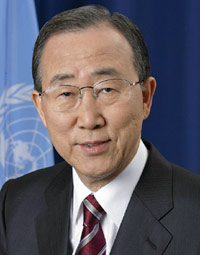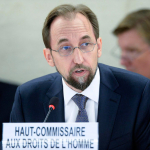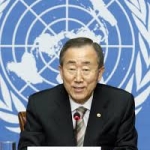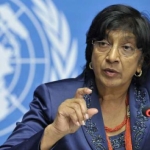Succesive UN High Commissioners for Human Rights, have demonstrated a strong commitment to the elimination of caste discrimination and made a number of significant statements on the issue as well as references to caste in reports. The UN Secretary-General has also spoken on caste on several occassions.
2018
Zeid Ra’ad al-Hussein said he is concerned that criticism of the government is met by claims that it constitutes sedition or a threat to national security.
The UN High Commissioner for Human Rights has presented his Annual Report to the UN Human Rights Council. The report features concern over the continuous deferral of applications for UN consultative status from civil society organisations and includes direct reference to IDSN’s application, which has been unjustly deferred by the NGO Committee for 10 years.
2016
September: In his opening statement for the 33rd regular session, the High Commissioner warned against the risk of violence erupting in Nepal as a result of caste discrimination and the many victims who are still in need of support following the earthquake in 2015.
September: In his report on the situation for human rights in Yemen (A/HRC/33/38*), the High Commissioner reported on recent attacks on residential areas which were primarily inhabited by people from the Muhamasheen community.
June: In his opening statement for the 32nd regular session of the Human Rights Council, the High Commissioner emphasized equality as a basic building block of coexistence within and between states: “every individual must be clear in the knowledge that regardless of sex, race, ethnicity, opinions, belief, caste, age or sexual orientation, her equal rights are fully acknowledged”.
May: In his foreword to the OHCHR’s annual report for 2015, the High Commissioner mentioned caste-based discrimination as one of the key human rights gaps, which needs further human rights monitoring through reporting and in depth investigations by the OHCHR.
May: On 17th May 2016, High Commissioner Zeid Ra’ad Al Hussein made a statement at the Brookings Institution wherein he addressed equal rights as an essential component for security and co-existence: “We need to begin by building trust. Rule of law institutions, which offer the confidence of impartial justice. Equality: every individual must be clear in the knowledge that regardless of sex, race, ethnicity, opinions, belief, caste, age or sexual orientation, her equal rights are fully acknowledged”.
March: In a statement to the 31st session of the Human Rights Council, High Commissioner for Human Rights Mr. Zeid Ra’ad Al Hussein noted that ten years after the end of the internal armed conflict in Nepal, there has been little progress in addressing its root causes, including entrenched ethnic and caste discrimination, unequal access to economic resources, extreme poverty and pervasive impunity.
2015
September: In his HRC30 Report on the Situation of Human Rights in Yemen, the High Commissioner noted that Yemen does not recognize in its legislation the marginalized status of some minority groups, who continue to suffer from discrimination, in particular the Muhamasheen community. The group has no political representation at the national level and suffers from extreme levels of social stigma and discrimination, which exacerbates their socioeconomic exclusion and poverty.
July: In the HRC30 Report of the UN Secretary-General on ‘Capital punishment and the implementation of the safeguards guaranteeing protection of the rights of those facing the death penalty – Yearly supplement of the Secretary-General to his quinquennial report on capital punishment’, the Secretary-General notes that research into death row prisoners in India has found that the overwhelming majority of the convicted individuals are poor and from lower castes.

UN High Commissioner for Human Rights – UN Photo
May: In the Foreword of the High Commissioner Mr. Zeid Ra’ad Al Hussein, in the OHCHR 2014 Annual Report, the High Commissioner notes that countries thrive when their institutions empower and protect the full rights of every person no matter their caste.
Our work was guided by the clear idea that protecting human rights is not only the most principled strategy; it is also the most effective one. Countries thrive when their political and economic institutions empower and protect the full rights, and full potential, of every person – regardless of their race or ethnic group; whether or not they are disabled; citizens or migrants; no matter their sex, their class, their caste, their creed, their age or sexual orientation. Respect for human rights builds societies that are more fair, more flexible and more likely to be prosperous and stable.
March: In the Statement of High Commissioner Mr. Zeid Ra’ad Al Hussein to the 28th session of the Human Rights Council on March 5 2015, upon presenting his report on OHCHR activities, the High Commissioner noted that societies that are participatory can benefit from the skills of all – including castes that previously suffered discrimination. See the video of the statement.
Economic and social rights build strong societies. They are not an optional luxury for times of peace; they are rights in the full meaning of the word, and a tool for building peace and powering true development. Societies that are participatory can benefit from the skills of all – including girls, women, and minorities and castes that previously suffered discrimination. And when adequate services are provided, such as decent health, education and housing, there is massive economic benefit to all, and a dividend in stable peace.
March: In the Opening Statement of High Commissioner Mr. Zeid Ra’ad Al Hussein to the 28th session of the Human Rights Council on March 2 2015, Mr. Zeid Ra’ad Al Hussein highlighted that the majority of victims of human rights abuses around the world share two characteristics: Deprivation, and discrimination – based on, among others, caste. See the video of the statement.
The overwhelming majority of victims of human rights abuses around the world share two characteristics: Deprivation, and discrimination – whether it is based on race or ethnicity, gender, beliefs, sexual orientation, caste or class. From hunger to massacres, sexual violence and slavery, human rights violations are rooted in these hidden, and sometimes not so hidden, factors. They are not spontaneously generated. Most violations of human rights result from policy choices, which limit freedom and participation, and create obstacles to the fair sharing of resources and opportunities. UN news article, 2 March 2015
February: In a speech of the UN High Commissioner for Human Rights, Mr. Zeid Ra’ad Al Hussein, at the Holocaust Memorial Museum in Washington DC, during his first official visit to the USA and in a speech at the Conference on “Education for Peace” at Palais des Nations in Geneva 14 January 2015, the High Commissioner emphasised that no-one is intrinsically superior to her or his fellow human beings, with reference to caste.
My children, and yours, and children everywhere, need to learn what bigotry and chauvinism are, and the terrible wrongs they can produce. They need to learn that blind obedience can be exploited by authority figures for wicked ends. They should also learn that they are not exceptional because of where they were born, how they look, what passport they carry, or the social class, caste or creed of their parents; they should learn that no-one is intrinsically superior to her or his fellow human beings. UN News Centre article, 5 February 2015
January:
“Development models must reach all groups. Inclusive growth brings shared prosperity. India has already lifted hundreds of millions of people out of poverty and it can bring the benefits of inclusive growth to millions more. Yesterday, I visited Mahatma Gandhi’s Sabarmati Ashram in Gujarat. I was deeply moved by how they are conserving and teaching Gandhi’s letters and other precious artefacts. And I reflected on our collective responsibility to conserve the spirit of Gandhi’s teachings. He confronted many forms of injustice, including against people who were then called “untouchables”. His struggle led to the historic resolution banning discrimination based on caste. Today India has laws that not only enshrine equality, but also take positive steps to address past discrimination. But millions of Dalits, Tribals and others still face discrimination, especially the women and girls. In too many communities, religious minorities also suffer. We must continue Gandhi’s battle for equality.” Secretary-General Ban Ki-moon keynote address to the Indian Council of World Affairs UN press release, 12 January 2015
2014
December: In the first Statement of the High Commissioner, Mr. Zeid Ra’ad Al Hussein, on Human Rights Day December 10 2014, the High Commissioner highlighted that human rights are the rights of all people no matter their caste. See also the Video statement
All human beings are born free and equal in dignity and rights: in perhaps the most resonant and beautiful words of any international agreement, the Universal Declaration of Human Rights promises, to all, the economic, social, political, cultural and civil rights that underpin a life free from want and fear.
These human rights are not country-specific. They are not a reward for good behaviour, or particular to a certain era or social group. They are the inalienable entitlements of all people, at all times and everywhere, 365 days a year. They are the rights of people of every colour, from every race and ethnic group; whether or not they have disabilities; citizens or migrants; no matter their sex, their class, their caste, their creed, their age or sexual orientation
December: In the closing remarks of the High Commissioner at the 6th Nelson Mandela World Human Rights Moot Court Competition on December 10 2014, Mr. Zeid Ra’ad Al Hussein noted that the overwhelming majority of victims of human rights abuses around the world share two characteristics: deprivation, and discrimination – whether it is based on race or ethnicity, sex, beliefs, caste or class.
December: In the Report of the Secretary-General – Review and appraisal of the implementation of the Beijing Declaration and Platform for Action and the outcomes of the twenty-third special session of the General Assembly, the Secretary-General notes case.
Women and the Economy. Global Trends. Looking more specifically at the quality and conditions of employment, gender inequality continues to be an important source of stratification, along with other inequalities such as geography, ethnicity and race or caste, with which it intersects.
September: In the Opening Statement of the newly appointed High Commissioner Mr. Zeid Ra’ad Al Hussein to the 27th session of the Human Rights Council on September 8 2014, Mr. Zeid Ra’ad Al Hussein highlighted caste asa ground of discrimination on par with other forms of discrimination:
Another lesson for me, twenty years ago, was equally clear: there is no justification ever, for the degrading, the debasing or the exploitation of other human beings – on whatever basis: nationality, race, ethnicity, religion, gender, sexual orientation, disability, age or caste.
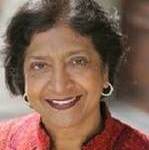
UN Photo: Ms. Navi Pillay
June: On Tuesday 17th June, the UN High Commissioner for Human Rights, Ms. Navi Pillay, gave the opening statement at a side-event on caste-based violence against women, at the 26th session of the UN Human Rights Council. The event came following a series of brutal rape cases against Dalit women and the rape and hanging of two teenage cousins in India.
Ms. Navi Pillay, the UN High Commissioner for Human Rights, opened the event with a statement on the magnitude and gravity of caste-based violence and the need for concerted action.
There is a fundamental need for renewed effort to train law enforcement, the judiciary and other key duty bearers to ensure that cases are properly handled from this point on, and that they act in conformity with international obligations.
Ms. Pillay said, adding that;
Violence against women of poorly regarded castes has very deep roots, which cannot be tackled without far-reaching efforts. Clearly laws are necessary, but they are not enough … there must also be fundamental change within communities, to peel off, layer by layer, the mind-set that generates caste discrimination and bigotry.
Ms. Pillay recounted the multitude of recommendations from Special Rapporteurs, Treaty Bodies, and the Universal Periodic Review Working Group and urged implementation by governments.
I urge governments to fully implement all the recommendations made by international human rights mechanisms, as well as those arising from national processes.
she said adding that,
Our outrage is not enough. We must take real and focused action to mend our societies’ dramatic failure to support the rights of people of discriminated castes, particularly women and girls.
UN Human Rights Chief to speak out on caste-based rape and violence at HRC26 side-event
Read the report from the Side-event here
IDSN and HRW press release: UN Rights Council: End Caste-Based Rape, Violence
news-resources/idsn-news/read/article/un-rights-council-end-caste-based-rape-violence/128/
June: In the Opening statement of Ms. Navi Pillay at the first meeting of the HRC26 June 10 2014, Navi Pillay highlighted caste and Dalits in her concluding remarks that focus on continued stone-walling and denial by states. Please find a link to the references here
May: In the OHCHR Strategic Management Plan 2014-17, there are important References to Caste-Based Discrimination. In Navi Pillay’s introduction, she noted that,
The exclusion, marginalization and abuse of people on the basis of their perceived race, their indigenous, ethnic or religious background, their colour, gender, caste status, disability, age, health status or sexual orientation, are scourges that the international community must combat.
March: On the occassion of the presentation of her annual report to the 25th session of the Human Rights Council (3-28 March 2014) on March 6. 2014, the High Commissioner issued a statement highlighting discrimination on the basis of caste.
The statement includes the following reference to caste in the section on discrimination, which is one of the six thematic priorities the office has pursued in 2013:
Excellencies, discrimination is a severe attack on the universality of human rights. The exclusion, marginalization and abuse of people on the basis of their perceived race, their indigenous, ethnic or religious background, their colour, gender, caste status, disability, age, health status, or sexual orientation, are scourges that my Office is determined to combat.
Navi Pillay’s statement to the 25th session of the Human Rights Council
March: Report of the Secretary-General Mr. Ban Ki-Moon on the question of the realization in all countries of economic, social and cultural rights March 2014
In the HRC report A/HRC/25/31 for the 25th session, the Secretary-General addresses the scope of and applicable standards relative to the right to access to justice and to an effective remedy for violations of economic, social and cultural rights. It is stressed that access to justice for violations of economic, social and cultural rights must be provided for all on the basis of equality without discrimination. Specifically, the Secretary-General calls for particular attention to be paid to direct or indirect discrimination on the basis of poverty, social marginalization, age, caste, race, colour, sex, language, religion, political or other opinion, national or social origin, property, birth or other status
2013
January: At the conclusion of the two-month long march to end manual scavenging in India, the Maila Mukti Yatra, the High Commissioner issued a message of support, congratulating the organisers as well as the participants. She noted that most manual scavengers are Dalit women who face multiple forms of discrimination because of their caste and gender.
Manual scavenging is not a career chosen voluntarily by workers, but is instead a deeply unhealthy, unsavoury and undignified job forced upon these people because of the stigma attached to their caste. The nature of the work itself then reinforces that stigma.
the High Commissioner said.
Pillay applauds Indian movement to eradicate ‘manual scavenging’(OHCHR)
April: When delivering a lecture on human rights during a visit to her native South Africa, Navi Pillay answered a question from the floor on the caste issue.
We can’t just relate caste to India, because it happens in many parts of the world.
she said.
I have actually met groups who are subject to discrimination against caste in Nepal and Japan, but India peculiarly thinks this word caste belongs to them and I know they have a political position that it should not be raised in international fora. They objected to my raising this issue when I was on a mission in India while I was actually supporting the Human Rights Commission in India that had raised the matter.
Caste discrimination not exclusive to India (Freepress Journal)
June: In a written statement to a UN side event on Dalit women, Ms Pillay pledged the continued support of her office to efforts to end caste discrimination and ‘untouchability’ and noted that these degrading practices are:
Further amplified by the intersection of discrimination based on caste and gender.
She also called on UN member states to
Take on the challenge of addressing caste-based discrimination and the human rights violations flowing from this seriously and by mobilising all of their relevant institutions to this end.
Navi Pillay’s statement to the side event on Dalit women
November: At a meeting at the House of Lords in London, the High Commissioner delivered a powerful speech on caste discrimination, urging the British government to implement legislation on the issue.
Caste-based discrimination is of immediate concern to my Office, because it is destructive of all we stand for.
she said and added that
A new law alone cannot be the silver bullet. We need more to bring down the beast of caste-based discrimination.
Statement by Navi Pillay at the London meeting on caste discrimination
2011
September: The High Commissioner delivered a video message at the launch of a 100-day campaign launched by her office and the National Dalit Commission (NDC) in Nepal.
I commit to end caste-based discrimination and untouchability!
she said and encouraged everyone to pledge their commitment to do the same.
Ms Pillay also gave credit to the Government of Nepal for enacting new anti-untouchability legislation.
By taking this important step to end these practices, Nepal has become a leader on the world stage in the fight against caste-based discrimination.
she said.
100-day campaign against caste discrimination and untouchability launched(IDSN)
The High Commissioner’s video message (YouTube)
2009
October: The High Commissioner issued an opinion piece under the headline ‘Tearing down the wall of caste’. Ms Pillay stated that
The time has come to eradicate the shameful concept of caste.
and called on the international community to come together
As it did when it helped put an end to apartheid.
She also argued that
Other seemingly insurmountable walls, such as slavery and apartheid, have been dismantled in the past.
and concluded that
We can and must tear down the barriers of caste too.
Tearing down the wall of caste (Opinion piece)
In an interview with the US weekly The Nation later that same month, Ms Pillay said that there may have to be an international human rights convention written to apply directly to caste.
Commenting on the situation of Dalits in India, she said:
They have good laws in India, and they have media; they have well developed civil society organizations. So how come there is no implementation of these good laws, these good intentions?
Putting caste on notice (The Nation)

